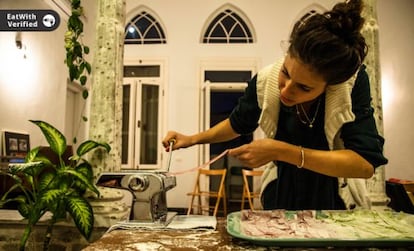Guess who’s coming to dinner?
Meal Sharing and EatWith websites allow visitors to foreign cities looking for a more intimate experience to dine with and get to know strangers in their homes

It is a well-known fact that in order to get to know a foreign city, it is best to stay away from the tourist routes and engage with the locals. This was the idea behind the virtual communities Meal Sharing and EatWith, which invite globetrotters to make a breakfast, lunch or dinner date with a resident of the place they are visiting.
At Meal Sharing, guests pay nothing for their food. All they need to do is create a profile on the website, explain what they like to eat, contact a host and make a date. "You don't need to be a good cook in order to share food. Anybody can be a host, the point is to offer some of what you have at home," says Ainara del Valle, one of the Spanish founders of the site and a host in Berlin, where she's been living since 2011.
The idea, says Del Valle, was born out of a passion for travel and for meeting people. "In the end what really connects you to a place is not the number of museums you visited, but the person you had a conversation with on a bus," she explains. Food seemed to her like the perfect vehicle to create that community spirit, since food is "fundamental, something that can bring intimacy in any culture."
And so, in November 2012, using Thanksgiving Day in the United States as the excuse, she and her friend Jay Savsani inaugurated the site. Savsani had already put the concept to the test during a holiday in Cambodia. "The meal was delicious, but sharing it was even better," says this American in his thirties who spent the entire night exchanging anecdotes with his host about their respective countries.
"It was then that I knew that the idea for the website was good. I wanted the greatest possible number of tourists to enjoy a similar experience," says the co-founder of Meal Sharing. Since then, the service has coordinated 983 dates throughout the world, of which 527 were in the US, 152 in Brazil and 100 in Germany.
What we've done is try to make hospitality more accessible"
EatWith offers a similar service, although the approach is a little more on the gourmet side. "Home is a restaurant" is how its founders, Guy Michlin and Shemer Schwartz, like to define it. In this case, the hosts are people who like to cook - there are even professional chefs on the list - and who have enough room at home to accommodate a considerable number of guests. In Barcelona, the Spanish city where the idea has been most successful, there are 127 opportunities to dine at someone's home for prices ranging from eight to 89 euros. EatWith, founded in Israel in 2010, has users in 20 countries and over 30 cities.
"At a restaurant, people go for the food and that's it. At a house, food becomes an excuse to share with others. The feeling is completely different," says Joel Serra Devin, a host in Barcelona.
The idea of hosting strangers in one's home or being a guest at an unknown house might sound strange to some. "People are usually a little nervous, but the moment they sit down and start to eat and talk, they relax and the conversation flows," says Del Valle, who once got 25 people together.
Maialen Gorricho, 28, had her first Meal Sharing experience with two girls who had dinner with her and her boyfriend at their home in the district of Vallecas in Madrid. Just to break the ice, she also invited five personal friends of hers, making the event "less formal" and "safer" as well. "If you don't trust people, then nothing ever gets done, right?" she asks.
"The notion of hospitality has been around for thousands of years. What we've done is try to make it more accessible," says Del Valle.
For the sake of safety, participants are encouraged to share their experiences. Organizers also carry out a selection process and inspect the premises before adding them to their site. At EatWith, an EatWith Verified label indicates which homes were inspected by a representative before being recommended on the website.
Tu suscripción se está usando en otro dispositivo
¿Quieres añadir otro usuario a tu suscripción?
Si continúas leyendo en este dispositivo, no se podrá leer en el otro.
FlechaTu suscripción se está usando en otro dispositivo y solo puedes acceder a EL PAÍS desde un dispositivo a la vez.
Si quieres compartir tu cuenta, cambia tu suscripción a la modalidad Premium, así podrás añadir otro usuario. Cada uno accederá con su propia cuenta de email, lo que os permitirá personalizar vuestra experiencia en EL PAÍS.
¿Tienes una suscripción de empresa? Accede aquí para contratar más cuentas.
En el caso de no saber quién está usando tu cuenta, te recomendamos cambiar tu contraseña aquí.
Si decides continuar compartiendo tu cuenta, este mensaje se mostrará en tu dispositivo y en el de la otra persona que está usando tu cuenta de forma indefinida, afectando a tu experiencia de lectura. Puedes consultar aquí los términos y condiciones de la suscripción digital.








































